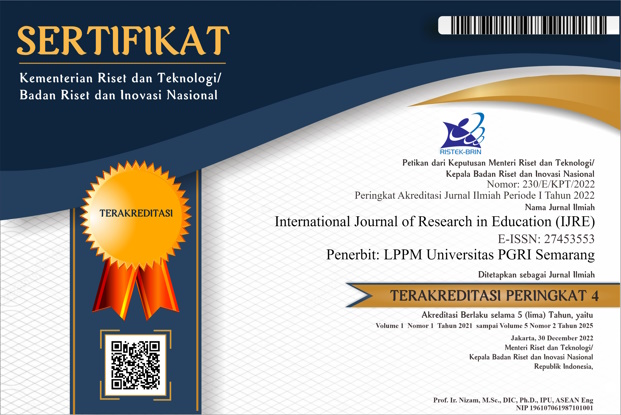Edmodo as Technology-Based Formative Assessment: How it Enhances Reading Comprehension
DOI:
https://doi.org/10.26877/ijre.v5i1.1368Keywords:
Edmodo, Technology-Based Formative Assessment, Reading ComprehensionAbstract
This study investigates the effectiveness of Edmodo as a technology-based formative assessment tool in enhancing students’ reading comprehension. Employing a quasi-experimental design, the research involved two groups of junior high school students: an experimental class and a control class, each consisting of 30 students. While the control class employed traditional formative assessment methods, which included direct question-and-answer sessions during face-to-face instruction, the experimental class integrated Edmodo as a platform for technology-based formative assessment. Reading comprehension tests, administered as pre-tests and post-tests, served as the primary data collection instrument. The data were analyzed using SPSS 23 for descriptive statistics, N-gain, and t-test to assess the impact of the intervention. Results revealed that the experimental class, which utilized Edmodo, demonstrated significantly higher improvements in reading comprehension compared to the control class. The N-gain analysis highlighted a substantial increase in the experimental group’s performance, indicating the effectiveness of Edmodo in supporting student engagement and understanding of reading materials. This study underscores the potential of technology-based formative assessments, particularly through platforms like Edmodo, in creating interactive, timely, and student-centered learning environments. By providing immediate feedback and fostering collaborative learning, Edmodo enhances students’ comprehension skills, thereby offering an innovative approach to formative assessment in English language teaching. These findings advocate for the integration of digital tools into assessment practices to improve learning outcomes in reading comprehension.
References
Afsharrad, Mohammad & Nafchi, Asghar Moulavi. (2015). The effect of transcribing on elementary Iranian EFL learners’ listening comprehension. Dinamika Ilmu, 15(2), 2015
Alkharusi, H., Aldhafri, S., Alnabhani, H., & Alkalbani, M. (2012). Educational assessment attitudes, competence, knowledge, and practices: An exploratory study of Muscat teachers in the Sultanate of Oman. Journal of Education and Learning, 1(2), 217-232. https://doi.org/10.5539/jel.v1n2p217
Barnes, N., Fives, H., & Dacey, C. M. (2017). US teachers' conceptions of the purposes of assessment. Teaching and Teacher Education, 65, 107-116. https://doi.org/10.1016/j.tate.2017.02.017
Bijsterbosch, E., Béneker, T., Kuiper, W., & van der Schee, J. (2019). Teacher professional growth on assessment literacy: A case study of prevocational geography education in the Netherlands. The Teacher Educator, 54(4), 420-445.
Broadfoot, P. (2007). An introduction to assessment. Bloomsbury Academic.
Brown, H. D., & Abeywickrama, P. (2010). Language assessment: Principles and classroom practices. Pearson Education.
Çetin, H. S. (2018). Implementation of the digital assessment tool Kahoot in elementary school. International Technology and Education Journal, 2(1), 9-20.
Dmitrenko, N., Budas, I., Koliadych, Y., & Poliarush, N. (2021). Impact of formative assessment on students’ motivation in foreign language acquisition. East European Journal of Psycholinguistics, 8(2), 36-50.
Ekmekçi, E. (2016). Integrating Edmodo into foreign language classes as an assessment tool. Participatory Educational Research, 3(4), 1-11.
Etfita, F. (2019). Students’ perspective on the use of Edmodo as an assessment tool. J-SHMIC: Journal of English for Academic, 6(1), 18-25.
Hadiyanto, H., Sulistiyo, U., Mukminin, A., Haryanto, E., & Syaiful, S. (2022). The effect of blended learning on EFL students' performance in research methodology and practice of 21st century skills. Journal of Educators Online, 19(3), n3.
Halil, N. I. (2020). The effectiveness of using edmodo as an online learning platform in Covid-19. Jurnal Penelitian Dan Pengkajian Ilmu Pendidikan: E-Saintika, 4(3), 284-298.
Hamedi, A., Fakhraee Faruji, L., & Amiri Kordestani, L. (2022). The effectiveness of using formative assessment by Kahoot application on Iranian Intermediate EFL learners’ vocabulary knowledge and burnout level. Journal of new advances in English Language Teaching and Applied Linguistics, 4(1), 768-786.
Islamiati, B., Sofya, H., & Kurniyanti, R. (2022, June). Analysis of the use of the Edmodo platform as an assessment medium for assess reading comprehension. In conference on English language teaching (Vol. 2, pp. 155-167).
Kaba, F. (2018). Edmodo as an assessment tool in the foreign language learning process. European Journal of Social Science Education and Research, 5(3), 117-122.
Kapsalis, G. D., Galani, A., & Tzafea, O. (2020). Kahoot! as a formative assessment tool in foreign language learning: A case study in greek as an l2. Theory and Practice in Language Studies, 10(11), 1343-1350.
Lee, J. Y., & Hidayat, D. N. (2019). Digital technology for Indonesia’s young people: the significance of SNS use and digital literacy for learning. MedienPädagogik: Zeitschrift für Theorie und Praxis der Medienbildung, 35, 20-35.
Luthfiyyah, R., Basyari, I. W., & Dwiniasih, D. (2020). EFL secondary teachers’ assessment literacy: Assessment conceptions and practices. Journal on English as a Foreign Language, 10(2), 402-421.
Ngo, J., & Ngadiman, A. (2019). The impacts of Edmodo on students’ performance in ESP classrooms. KnE Social Sciences, 369-378.
Prastikawati, E. F., Wiyaka, W., & Lestari, M. Y. W. (2022). Secondary school students’ perception on Edmodo as online learning platform in English learning. Language Circle: Journal of Language and Literature, 16(2), 296-307.
Sabiq, A. H. A., & Ardiana, A. P. (2020). Hots-Based Analysis on English Reading Comprehension Formative Assessment. Tarling: Journal of Language Education, 4(1), 19-36.
Sakat, A. A., Zin, M. Z. M., Muhamad, R., Anzaruddin, A., Ahmad, N. A., & Kasmo, M. A. (2012). Educational technology media method in teaching and learning progress. Advances in Natural and Applied Sciences, 6(3), 484-490.
Solihin, R. K., & Muhria, L. (2023). The Effectiveness of the blended learning approach based on Edmodo to enhance student learning outcomes in English Courses. Scope: Journal of English Language Teaching, 8(1), 208-212.
Susanti, A., & Putri, D. N. (2022). Edmodo as online assessment tool: to improve EFL students’ reading comprehension. Satya Widya, 38(1), 12-24.
Webber, K. L. (2012). The use of learner-centered assessment in US colleges and universities. Research in Higher Education, 53, 201-228.



